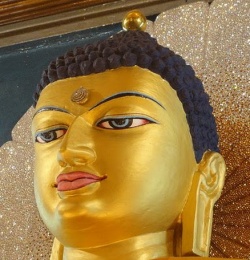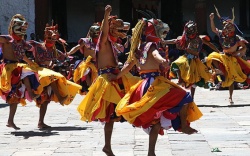Rahula was the only son
Rahula was the only son of Prince Siddhattha and Princess Yasodhara. He was named Rahula by his grandfather because the first word Prince Siddhattha said on hearing about the birth of His son was Rahu, which means obstacle. An obstacle to His renunciation had arisen. It was on the day that Prince Rahula was born that Prince Siddhattha made the Great Renunciation. With a heavy heart Prince Siddhattha left His beloved wife and new-born son to seek the path to end suffering for the benefit of mankind and Devas (divine beings).
Prince Rahula saw His father for the first time at the age of seven. Princess Yasodhara pointed out the majestic Buddha with His retinue of monks to Rahula from the balcony of the palace. She then described his father, the Buddha, to her son in the Sutta known as "The Lion of Men". After praising and describing the Buddha, the Princess requested her son to approach his father and ask for his inheritance.
As instructed, Rahula approached his father and asked for his inheritance. He then looked at his father and said, "Lord, even your shadow is pleasing to me." Rahula then followed the Buddha back to the Nigrodharama monastery where He was residing. The Buddha thought, "Little Rahula asks for his inheritance. But worldly treasures and wealth cause suffering. I shall give him the most valuable treasure in the world. I will give him the Dhamma." Calling Venerable Sariputta, His chief male disciple, He asked him to ordain little Rahula.
King Suddhodana was very sad when he heard of the ordination of his beloved grandson. He said: "When the Lord renounced the world it was a cause of great pain to me. It was with deep sadness that I watched Nanda renounce the world. But it is especially painful when little Rahula renounces. The love of a father to a son is deep and cuts through the skin, flesh, sinew, bone and marrow. Grant, Lord, that Noble Ones will not ordain sons without permission of their parents." The Buddha readily agreed to this request and made it a discipline (Vinaya) of the Noble Order.
Sariputta and Moggallana were little Rahula’s teachers. While Sariputta taught Rahula knowledge of the Dhamma, Moggallana concentrated on his conduct. Even though Rahula was only seven when he became a novice monk, he was very eager to accept instruction and was exceptionally cultured and obedient. Each morning he would rise and, taking a handful of sand, throw it up in the air saying, "Today may I receive from my teachers as much advice and instruction as these grains of sand."
Shortly after Rahula’s ordination the Buddha taught him the importance of telling the truth. This discourse is known as the Rahulovada Sutta. The Buddha placed truth as the highest of all virtues. The seekers of Truth, (those who have as their goal Nibbana) should not break the precept of Truth. The Buddha explained this in a way a young child would understand by using the following example.
Rahula had just washed the feet of the Lord and prepared a seat for Him. Taking the vessel which now contained a little bit of water at the bottom, the Buddha showed it to Rahula and said: "Rahula, do you see the small (insignificant) amount of water left in this vessel? Similarly, Rahula, insignificant (of little value) is the character of those who are not ashamed of telling lies."
The Buddha then discarded this little bit of water and said; "Rahula, do you see how I discarded the little bit of water in this vessel? Similarly discarded (set aside and not recognized) is the character of those who are not ashamed of telling lies."
He then overturned the pot that had contained the water and said, "Rahula, do you see how easily I overturn this vessel? Similarly easily overturned (easily influenced and changed) is the character of those who are not ashamed of telling lies."
Finally, the Buddha placed the pot upright, showed it to Rahula and said, "Rahula, do you see this empty vessel that is void of any water? Similarly empty and void is the character of those who are not ashamed of telling lies."
The Buddha said that the precept of truth was the most important of all the precepts, as a person who tells lies would very easily then break the other precepts and cover up his misbehaviour by telling lies. A person who always told the truth would not perform an act he would be ashamed to own up to later.
The Buddha also instructed Rahula on reflecting and thinking before he acted to ensure that his actions were moral and conducive to the well-being of others and himself, by using examples and language a young child would understand.
Showing him a mirror, the Buddha asked Rahula what a mirror was used for. Rahula replied that it was for the purpose of reflecting. The Buddha then said: "Similarly, Rahula, before you say or do anything, reflect. Reflect if this speech or action would be beneficial to others and yourself. If, when you reflect, you feel that it is not beneficial to others and to yourself, then refrain from saying and doing it. If you feel when you reflect that it is for the benefit of yourself and others, that such an action will not bring harm to another, that it is beneficial to others, then and only then should you perform this action. You should then perform this action again and again."
With this simple but easily understood example the Buddha introduced little Rahula to mindfulness and the discipline of the mind before action so that his thoughts, speech and actions would be moral and wholesome.
Rahula was well-known for his obedience and truthfulness. As the son of the Buddha and because of his pleasing nature and young age he was well-liked by all. When Rahula was eighteen, the Buddha preached to him a very deep discourse on sense desire. He helped Rahula, who was pleased with his very handsome appearance, understand the dangers of vanity.
The Buddha, accompanied by Rahula, was seeking alms. They both looked exceedingly handsome, like a majestic royal elephant and his calf, a beautiful swan with his cygnet. Rahula, seeing the extremely handsome appearance of the Buddha, thought, "I too am like my parent, the Exalted One. Beautiful is the Buddha’s form and mine is similar."
The Buddha instantly read his thoughts and said, "Rahula whatever form there is should be looked at as follows: "This is not mine; this am I not; this is not my soul." Rahula then inquired if it was only form that should be regarded thus. The Buddha then said that all five aggregates should be regarded thus. In this way the Buddha introduced the very deep and difficult concept of no permanent soul (anatta) to Rahula.
Rahula then chose not to seek alms and instead went back and sat in meditation reflecting on the words of the Buddha, trying to understand and penetrate the Truth of the Buddha’s words. Shortly after, on hearing the Cula Rahulavada Sutta, he attained Arahanthship. The following words were uttered by Rahula on attaining Arahanthship:
Being fortunate from both sides,
They call me "Lucky Rahula",
I was the son of the Buddha,
The son of the Seer of Truth.
Blinded by sense desires spread over like a net,
Covered by a cloak of craving,
Bound by the kinsmen of heedlessness,
I was like a fish caught in the mouth of a funnel-net.
That sense desire I have burnt,
The bond of mara (death) I have cut.
Eradicating craving from its root,
Cool am I, peaceful am I.
Destroyed are all my corruptions,
There is no more rebirth for me,
An Arahanth am I, worthy of offering,
Possessed of threefold knowledge and a seer of the deathless.
-- (Theragatha 295-298)
Rahula passed away before the Buddha, Sariputta and Moggallana. The Buddha declared that Rahula was foremost among the monks for his high standard of discipline and obedience. Rahula, who had entered the order at the tender age of seven, was a role model for the younger members of the Noble Order through his obedience and pleasing nature.



